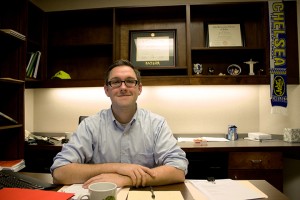
By Rebecca Flannery
Staff Writer
The American Diabetes Association is making efforts to educate the public about the widespread disease during November.
As the final installment of the Diabetes Awareness Month series, Brett Christenson, lecturer of marketing in the Hankamer School of Business, explains how his perspective of Type I diabetes condition has changed over time.
When were you diagnosed?
I found out I had diabetes my senior year of high school in February of 2002. What I noticed was, over the winter that year, I was seeing symptoms of diabetes. I didn’t know what was wrong. I just thought I was a lazy high school student. I was tired all the time, I was thirsty a lot of the time, and I just thought I was being lethargic as a senior in high school – a severe case of “senioritis.”
Then what happened was, I stopped playing sports and I began exercising on my own and I lost about 30 pounds in a month. I was losing a lot of body content. I was sleeping a lot and it got to the point where I was only awake for three to four hours a day.
I told my parents, “I think something is wrong. I don’t feel very well.” So they took me to the doctor. I thought the doctor was going to tell me it was the flu, or something more minor, that had escalated to a major level. They did blood tests, came back and said, “Oh, you have Type 1 diabetes.”
Was there a history of the disease in your family?
I didn’t have any experience with it. No one in my family had it, no one in my family could educate me about it and I didn’t know what it was when I was first diagnosed.
I told the doctor, “OK, cool. Is there a shot for that?”
My doctor said, “Absolutely, but you have to do it every day.”
Over the next couple weeks, it was a crash course into what this thing was. And I continue to educate myself when new information is found out.
Following the diagnosis, how did your life change?
It was a mental shift first, then it was a physical shift. The first change I needed to realize was to understand that I was going to have to inject myself with needles. I hate needles. Nobody thinks that stabbing themselves with sharp things is a good idea.
I had to understand I needed to be more conscious of food intake, of stress, exercise and taking medicine. I needed to understand that this was something that was always going to be on my mind. It seemed like a burden up front, but I learned to tackle it.
It was a growing-up transition.
Has there ever been a time between diagnosis and now that you thought you could lose your life from the disease?
No. I’ve been extremely fortunate and vigilant with my care, in terms of not killing myself. Have there been times where I’ve mismanaged it? Absolutely, maybe weekly. Sometimes you take a little bit too much medicine or you exercise too much, but there’s never come a point when I’ve been in dire need of medical attention.
What have you learned about your disease since being a student?
I just turned 30 this year. Looking back to when I was 20, I had blinders on. I have no idea how I was surviving. I see my food intake differently than when I was 20. I don’t focus on every aspect of a nutritional label. I focus only on sugar and carbohydrate intake.
I think the biggest change is probably perspective. When I was 20, I only cared about what I was doing when I was 20 years old. Now that I’m 30 I think about how if I don’t take care of my blood sugar right now, then when I’m 60 I’m going to have some huge medical problem I’m going to deal with. I’m more concerned for 60-year-old Brett right now than I am for 30-year-old Brett.
What piece of advice do you have for those who are just getting diagnosed with the disease?
You can have a positive mindset no matter what. We’re very fortunate to have a popular disease. By that I mean, there’s a large part of the population that is developing this. If there were only one or two people diagnosed, you’d kind of be out of luck. Nobody would be researching it and nobody would be donating to it.
As soon as you get a large group of people, all of a sudden you get a lot of coverage and funding. So, I’ve always thought I was very fortunate to have this disease because at least someone is working on it. There’s hope that this can be eradicated or cured.
If you’re just now finding out you have diabetes, don’t fret. It’s not a death sentence. You can still do everything that anybody can do. Now you’re just a little more aware about how the world works. You’ll appreciate life a little bit more.
Or I could say, “It’s going to be sweet!” That’s a diabetic joke.





